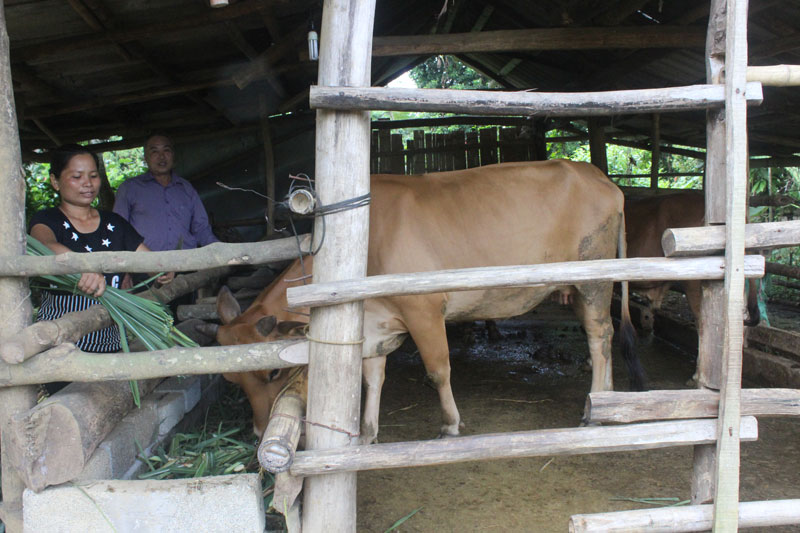
(HBO) – Over the past years, the credit programme for poor households has significantly contributed to poverty reduction and the implementation of the national target programme on sustainable poverty reduction in the northern mountainous province of Hoa Binh.

With
preferential loans from the Vietnam Bank for Social Policies (VBSP), people in
Toan Son commune, Da Bac district, Hoa Binh province, has invested in cow
breeding.
During
2002-2007, the province gave loans of more than 2.4 trillion VND to 217,370
households, with debt collection at over 1.6 trillion VND and outstanding debt
exceeding 863 billion VND, making up 32.4 percent of total outstanding debt.
At
the end of March 2018, accumulated outstanding debt of the programme was more
than 873 billion VND, with 33,018 households in debt, each with 26 million VND.
To
help eligible people access credit loans, improve the quality of credit loans and
support the poor in the context of reduced management and social costs, the
bank has launched entrusted loans via four social-political organisations.
At
the same time, transaction venues have been set up in 210 wards, communes and
towns, which publicise preferential credit policies and address relevant
procedures. More than 90 percent of transactions of the bank have been handled
at these sites with the same quality as in the headquarters.
Vu
Dinh Hoai, Director of the bank’s provincial chapter, said the programme has
opened up opportunities for poor households to access preferential loans,
meeting their demands for capital for production and education while creating
conditions for them to improve living standards and escape from poverty.
Between
2002-2017, more than 90,000 households in the province escaped from poverty,
and the rate of poor households dropped by 3 percent annually.
It
can be said that the credit programme has created a momentum for the poor
households to develop economy and reduce poverty sustainably, he said.
However,
Hoai added that to make the best use of the loans, the localities should pay
attention to vocational guidance, integrate agricultural and forestry
programmes, encourage people to shift economic structure, effectively utilise
local potential and strength, and accelerate poverty reduction./.
The Department of Education and Training of Hoa Binh province held a conference on March 18 to review the performance of the "Safe and Happy School" Project and set out tasks for 2025. The project, funded by the Taiwan Fund for Children and Families (TFCF), aims to create a safe, inclusive, and supportive learning environment for students. The event saw the attendance of representatives from the TFCF and 26 beneficiary schools.
With over 70% of their workers being women, trade unions across industrial parks (IPs) in Hoa Binh have been actively safeguarding their legal rights and interests while implementing initiatives to improve their income and well-being.
In recent years, the Hoa Binh provincial General Hospital has continuously innovated itself and improved the quality of medical services to meet the increasing needs of local people. With substantial investments in infrastructure and modern equipment, along with a team of highly qualified doctors and nurses, the hospital has gradually established itself as one of the leading medical units in the Northwestern region and a trusted destination for healthcare for people inside and outside the province.
From mastering the fundamentals of programming to achieving national recognition, the Programming Club of the Le Van Tam Primary School (STAR LVT28) in Hoa Binh city has made remarkable strides in the field of robotics.
The Ho Chi Minh Communist Youth Union Committee and the Vietnam Youth Federation chapter of Hoa Binh province organised a programme on March 12 to launch the "Digital Literacy" movement and an online quiz on the resolutions of the Vietnam Youth Federation congresses at all levels, as well as the Politburo's Resolution No. 57-NQ/TW on breakthroughs in the development of science, technology, innovation, and national digital transformation.
As climate change grows more unpredictable, the development of production forests has become essential - not just for economic growth, but for safeguarding the environment and maintaining ecosystem balance. By boosting local incomes, curbing natural disasters, preventing soil erosion, and protecting water resources, these forests play a crucial role in sustainable development.



